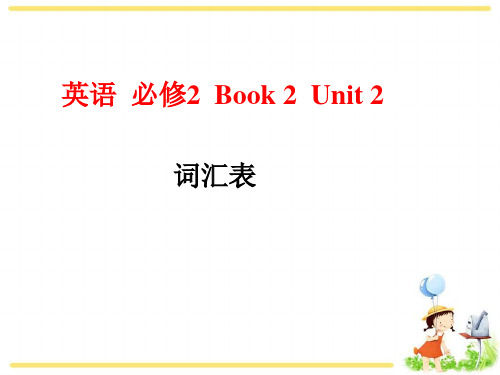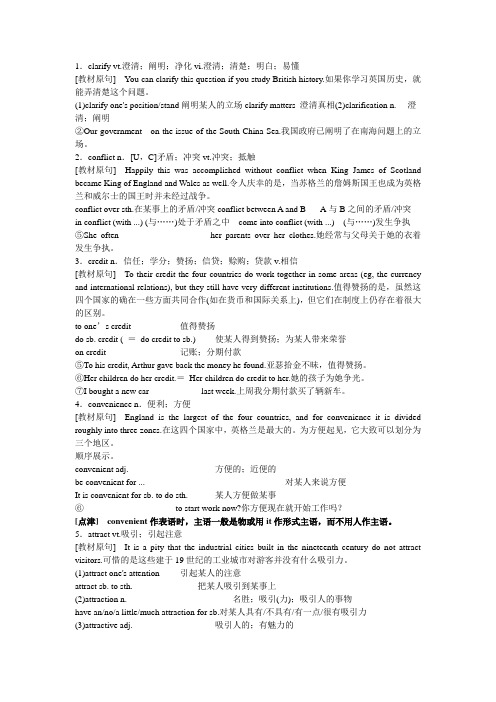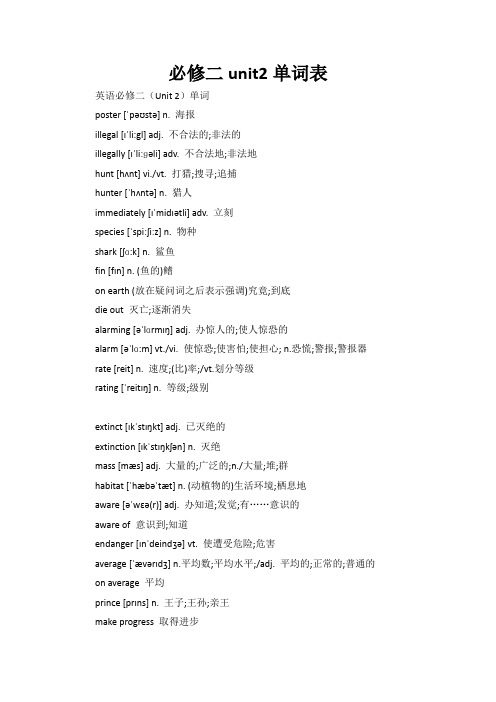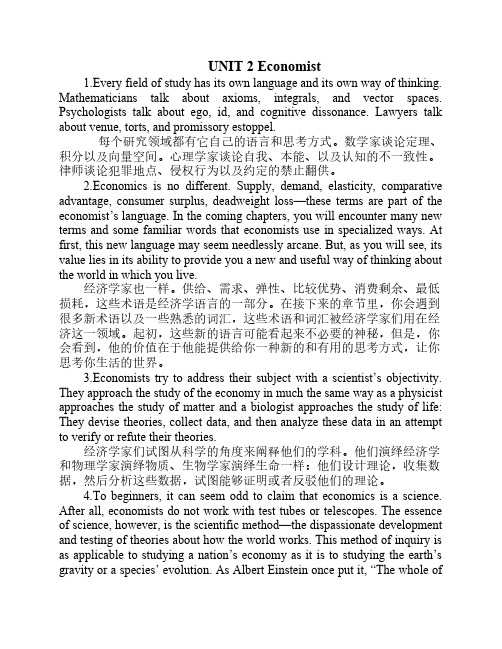Unit 2
unit 2 单词(完整)

1.容许,准许……进(加)入 a.Only one hundred boys are admitted to/into
the school every year.
每年学校准许100名男生入校。
b.He is admitted as a member of the basketball team.
他被接受成为篮球队的一名队员。
4. take part in 参加;参与
They often _____ take _____ part ____ in outdoor
activities.
他们经常参加室外活动。
take part in join in join
参加活动,并在其中起 积极作用 参加小规模的活动如 “球赛、游戏”等 加入某人或某个组织成 为其中一员 参加会议、婚礼、典礼; 听报告、讲座
英语 必修2 Book 2 Unit 2
词汇表
1. ancient ['eɪnʃ(ə)nt] adj. 古代的.古老的 2. compete [kəm'piːt]vi. 比赛;竞争
petitor [kəm'petɪtə]n. 竞争者
The cycle of learning vi. 比赛;竞赛 compete [kəmˈpi:t] competitive [kəmˈpetətɪv] adj.竞争的 n. 比赛,竞赛 competition [ˌkɒmpəˈtɪʃn]
stand by sb.
反对
支持某人
辞职
stand out stand against
stand down
袖手旁观,支持
显眼,突出
7. △ mascot ['mæ skɒt] n 吉祥物
Unit 2 知识点提要

8A Unit 2 知识点提要一、词汇1.广告可n. advertisement ▲(an/-s)2.英国的adj. British3.美国的adj. American4.饼干可n. <英> biscuit (a/-s)、<美> cookie (a/-s)5.卡车可n. <英>*lorry ▲(a/lorries)、<美> truck (a/-s)6.橡皮可n. <英> rubber (a/-s)、<美>eraser ▲(an/-s)7.足球可n. <英> football (a/-s)、<美> *soccer (a/-s)8.假期可n. <英> holiday (a/-s)、<美> vacation (a/-s)9.秋天可n. <英> autumn (a/-s)、<美> fall (a/-s)下落;跌倒;倒塌↓v. fall→三单:-s →▲过去式:fell →▲现分:-ing10.商店可n. <英> shop (a/-s)、<美> store (a/-s)11.院子可n. <英> garden (a/-s)、<美> y ard (a/-s)12.电影可n. <英> film (a/-s)、<美> movie (a/-s)[典型例题]( ) 1. People in the UK say biscuit while people in the USA say ______.A. cakeB.cookieC.eraserD.soccer( ) 2. Which sentence is likely (可能) to be spoken by Americans?A. David Beckham is a popular soccer star.B. The shop sells different kinds of biscuits.C. It doesn’t rain often in this city in autumn.D. The film is very popular.( ) 3. If you are an Englishman, you may say “__________ ”A.I want some cookies.B. Autumn is coming.C. Can I borrow your eraser?D. He often plays soccer with his friends.13.男女混合的,混合的adj. *mixed★一所混合学校a mixed school混合v.8AU4mix →▲三单:-es →过去式:-ed →现分:-ing把A与B混合mix A with B把...混合在一起8AU4mix ... together14.法语不可n. &法国人可n.(a/-s) &法国(人)的adj.8BU4French法国可n. France (a/-s) 常用单数15.外国的adj. foreign (not in or from your own country)外国人可n. foreigner (a/-s)16.语言可n. language (a/-s) (words used in speaking and writing)区分:青少年可n. *teenager (a/-s)17.在…期间prep. during18.讨论,议论v. discuss (talk about something)→▲三单:-es →过去式:-ed →现分:-ing★与某人讨论某事discuss sth. with sb.讨论可n.8BU5 discussion (a/-s)19.在课堂上(短语)in class20.<口>家伙可n. *guy (a/-s)21.<口>好朋友;搭档可n.*buddy ▲(a/buddies)22.主动提出,自愿给予v. offer (give something to someone)→三单:-s →过去式:-ed →现分:-ing★为某人提供某物(2种)offer sth. to sb.= offer sb. sth.★给某人某物(2种)give sth. to sb.= give sb. sth.23.结束v. end →三单:-s →过去式:-ed →现分:-ing终止;末尾;终点可n.7BU8end (a/-s)24.棒球可n. baseball (a/-s)25.赢得;赢,获胜v. win (be best or first in a competition)→三单:-s →▲过去式:won →▲现分:winning获胜者可n. winner (a/-s)26.最少的;最小的adj. (little的最高级) least27.至少,不少于(短语)at least28.至多,不超过(短语)at most29.较远(的)/更远(的) adj.&adv. (far的比较级) farther/further★further常考固搭(5种)进一步学习/研究further study/ research 进一步讨论further discussion更多的信息further information 其他的问题further questions再往前/下走8BU3further on/ down30.最远(的) adj.&adv. (far的最高级) farthest/furthest31.花费(时间或金钱) v. spend →三单:-s →▲过去式:spent →现分:-ing★★★★★“花费”公式(4种)It/事takes/took sb. 时间段to do sth.人spend(s)/spent时间段/金钱on sth.(in) doing sth.人pay(s)/paid(金钱)for sth.物cost(s)/cost sb. 金钱(A.takes; spendsB. takes; costsC. costs; costsD. spends; takes( )2. [基础题]The trip to the zoo _______ us about one hour by underground yesterday.A. paidB. tookC. spentD. cost( )3. [易错题]This dress is too expensive, it ____ me 2000 yuan.A.takesB. spendsC. paysD. costs( )4. [难题]He tries to spend as much time as he can ____ computer games.A. playB. playsC. playingD.to play32.制服可n. *uniform ★(a/-s)穿校服wear a school uniform= wear school uniforms33.国际象棋不可n. chess34.每日的,日常的adj.&日报n. daily35.每周的adj. weekly36.快的adj. quick 比较级:-er 最高级:the -est快地adv. quickly比较级:more ~ 最高级:the most ~慢的adj. slow 比较级:-er 最高级:the -est慢地adv. slowly比较级:more ~ 最高级:the most ~37.自始至终,从头到尾&(内部)穿过7BU6 prep. th r ough区分:though/although prep. 尽管thought v. 认为(think的过去式)38.浏览,快速查看(短语)look through39.真实的,真的adj. real真实地;确实,的确adv. really40.起初,首先(短语)at first41.继续/重复做某事(短语)keep (on) doing sth.[拓展] “继续做某事”(4种)keep (on) doing sth.= continue doing sth.= carry on doing sth. = carry on with sth.42.完成;结束v. finish →▲三单:-es →过去式:-ed →现分:-ing★完成做某事finish doing sth.43.午餐时间不可n. lunchtime★在午餐时间at lunchtime44.物理(学) 不可n. physicsPhysics _______ (be) a useful subject, the student must learn it wisely and well.45.羽毛球运动不可n. *badminton[总结] ★★★常考冠词题play+球类、棋、牌、中国乐器 e.g. play baseball/badminton/chess/cards/erhu(二胡) play the+西洋乐器 e.g. play the piano/violin/guitar/drums(鼓)46.理想的adj. *ideal★一所理想的学校an ideal school区分:想法,主意,思想可n. idea▲(an/-s)二、语言点1.(某人)为什么不做某事Why don’t/doesn’t/didn’t sb do sth. =why not do sth.2.like作动词意为“喜欢”,作介词意为“像”(无时态、人称、数的变化)be like 像;look like 看起来像像做某事be like doing sth.—What is your school life like?—It is like _______ (live) in a big garden.( ). Tom, _____ his brother, _____ playing basketball after school.A.like; likesB. like; likeC. likes; likesD. likes; like3.little “几乎没有”,修饰不可n. a little “有一些”,修饰不可n.few “几乎没有”,修饰可n.复 a few“有一些”,修饰可n.复4.你想要做某事吗?Would you like to do sth. ?肯定回答:Yes, I’d like/love to. 否定回答:I’d like/love to, but……5.做某事玩得开心have a good/great/nice/lovely/wonderful/fantastic time doing sth.有很多much/lots of/a lot of没有have no有更多时间做某事more time to do sth.有更少less有一段some time[典型例题]( )1. —Hey, guys. Do you often have a good time _____ after-school activities?—Of course, we do. And we always have a lot of time_____ soccer.A. to do; to practiseB. doing; to practiseC. to do; practisingD. doing; practising( )2.Amy had a lovely time ____ one place after another in Shanghai and she had much time _____ the city.A. to visit; to enjoyB. visiting; to enjoyC. to visit; enjoyingD. visiting; enjoying( )3.Linda had a great time ____ with her friends, and they also had some time ____ about their studies last weekend.A.to talk; to talkB. to talk; talkingC. talking; to talkD. talking; talking6.练习做某事practice doing sth.( )1. My brother enjoys __________ the piano in the music room.A.practice playingB. practice playC. practicing playingD. practice to play( )2. The two girls always have a good time ________ the piano together.A.practice to play B.to practice to play C.to practice playing D.practicing playing( )3. [难题]We should spend as much time as we can __________ English every day.A. practice speakingB. practice to speakC. on practicing speakingD. practicing speaking7.给某人买某物buy sth. for sb.= buy sb. sth.8.在几年级(2种)in Year/Grade+基数词= in the+序数词+year/gradee.g. 在八年级______________________= ______________________(思考:如果改用阿拉伯数字呢?)9.单个动名词作主语,谓语动词用单数As we all know, using public chopsticks ________ (be) necessary when we eat with others.10.“借”(3种)borrow/borrowed 借入borrow sth. from sb.从某人那借来某物lend/lent 借出lend sth. to sb.= lend sb. sth.把某物借给某人keep/kept 借用keep sth. for+时间段借用某物一段时间How long提问①(for)+时间段①since +时间点①since 从句How soon提问in +时间段How far提问路程①实际距离 e.g.500 metres①s’ walk/ ride /drive /flight(航行) /bus ride /car ride/ train ride①时间段+交通方式e.g. 15 minutes by bus How often提问频率①次数+a+时间单位 e.g. twice a week①every+时间单位 e.g. every day③频度副词7个:always总是、usually通常、often经常、sometimes有时、seldom很少、hardly几乎不、never从不( )1—How far is it from your home to your school? —________.A.On foot B.I can take a bus there C.It’s about half an hour D.About ten minutes’ walk( )2.— How long have you had the bike? — ______ two years. A.in B.until C.since D.for ( )3.— How soon will these waste bottles be recycled?—_________. I have called the recycling company. A.For an hour B.An hour ago C.After an hour D.In an hour( )4.—_________ do you go to the concert? — Always, because I’m interested in it.A.How longB. How soonC. How oftenD. How far( )5. —________ is it from here to your home town? — Well, it takes over three hours to get there by coach. A. How soon B. How much C. How long D. How far( )6.—________do you have after-school activities? —Twice a week.A.How long B.How far C.How often D.How soon( )7. [易错题]—________ do you hear from your parents a week? —At least twice a week.A. How many timesB. How soonC. How oftenD. How long12.一篇由一个美国男孩写的文章an article (written) by a boy from the USA13.the number of…“…的数量”作主语,谓V.用单数;a number of…“许多”作主语,谓V.用复数( ). —A number of volunteers ________ willing to teach in China’s rural areas(农村地区).—Yes, the number of them _______ getting ________.A. is; are; more and moreB. are; is; larger and largerC. is; is; bigger and biggerD. is; are; more and more14.提问数量的句型(2种)What’s the number of the students in your class?=How many students are there in your class?15.seem“似乎”用法(3种)①seem (to be)+adj. ②seem to do sth. ③It seems that+从句16.[难点]need作动词的2种用法若need是情态动词,need do sth. ; 若need是实义动词,need to do sth.解题关键:如何判断need是情态动词还是实义动词?法一:看三单__________________ 法二:看否定__________________ 法三:看提问__________________ ( )1. Millie ______ her homework at the moment.A. needs not finishB. doesn’t need finishC. need not to finishD. doesn’t need to finish( )2. You needn’t ______ those things if you ______ them.A.buy; needn’tB.to buy; don’t needC.buy; don’t needD.to buy; needn’t( )3. —Does he need ______ there at once ? —No, he ______ leave so hurriedly because he has enough time.A. to go; needB. go; needn’tC. to go; needn’tD.go; doesn’t need17.代词it/one(s)的区分:it同类且同物、one(s)同类不同物( ). —The black dress doesn’t look nice on me. I don’t like _____ at all. —How about the blue _____?A.one; one B.it; one C.it; it D.one; it18.Each of(√);every of(×)19.Each of us ________(have) a book. We each ________(have) a book.20.有一个星期的假期have a week off21.★对每科进行一次月考have a monthly test on each subject22.我的日常生活my daily life23.有很多时间参加课外活动have lots of time for after-school activities24.★有一小时的家庭作业have an hour of homework25.★进行一次学校旅行(2种)go on/for a school trip26.★停止做某事(同一件事)stop doing sth. 停下来去做某事(另一件事)stop to do sth. ( )1. We have worked so long. Let’s stop ______ a rest.A.have B.to having C.having D.to have( )2.My father told me a funny joke and I can’t stop ________ every time I think of it.A.to laugh B.laughing C.from laughing D.Laughmore+可n.复/不可n.+than 比…多less+不可n.+than 比…少fewer+可n.复+than 比…少the most+可n.复/不可n.最多the least+不可n.最少the fewest+可n.复最少。
大学英语unit2答案

大学英语unit2答案大学英语unit2答案【篇一:全新版大学英语(第二版)综合教程2课后练习答案】nglish book 2unit 1★ text avocabularyi.1.1) insert2) on occasion3) investigate 4) in retrospect5) initial 6) phenomena) not…in the least 11) promote 12) emerged2. 1) there is a striking contrast between the standards of living in the north of the country and thesouth.2) natural fiber is said to be superior to synthetic fiber.3) the city’s importance as a financial center has evolved slowly.4) his nationality is not relevant to whether he is a good lawyer.5) the poems by a little-known sixteenth-century italian poet have found their way into someenglish magazines.3. 1) be picked up, can’t accomplish, am exaggerating2) somewhat, performance, have neglected, they apply toi. 1. 1) abrupt2) emotional 3) bless 4) wear and tear 5) dated6)consequences7)seemingly 8) in contrast to 9) curiosity 10) genuine11) primarily 12) sentiments2. 1) when you are confronted with more than one problem, try to solve the easiestone first.2) water is vital to the existence of all forms of life.3) there is still some confusion among the students about what to do after classto follow up on the subject.4) as a person of simple living habits, he needs nothing more than a job and anapartment to be happy.5) it tickled him to think that she’d come to as his advice.3. 1) a lingering, fabricating, sentiments2) fill out, every item, vital, consequences3) be denied, tangible, cherish, attainii.1. it’s a long trip and will take us five hours by bus.2. she arrived early and took a front row seat.3. don’t take me for a fool.4. it takes a lot of imagination to fabricate such a story.5. my uncle will take me (along on his trip) to the arctic this summer.6. he took the dinner plate i passed to him.7. kevin took second prize in the weight-lifting competition.8. if you don’t take my advice, you will regret it.iii.1. hanging2. to give3. to return4. being praised5. not having written6. to say7. to open8. being helpedcomprehensive exercisei.1. 1) well-off/affluent2) dated3) falling into4) bracket 5) deny 6) tangible 7) pursuit 8) cherishes 9) out of place 10) abrupt 11) focus 12) donations2. 1) consume2) fueled3) annual4) plain5) physically6) security 7) indicates8) equally9) traditional10) followsii. translation1. 1) the company denied that its donations had a commercial purpose.2) whenever he was angry, he would begin to stammer slightly.3) education is the most cherished tradition in our family. that’s why my parents never took me to dinner at expensive restaurants, but sent me to the best private school.4) shortly after he recovered from the surgery, he lost his job and thus had to go through another difficult phase of his life. 5) in contrast to our affluent neighbors, my parents are rather poor, but they have always tried hard to meet our minimal needs.2. with more and more donations coming in, our university will be much better off financially next year. we will thus be able to focus on the most important task that we, educators, must take on: to encourage students to attain theirscholarly/academic goals, to train them to be dependable and responsible individuals, to prepare them for the life ahead, and to guide them in their pursuit of spiritual as well as material satisfaction.★ text bcomprehension check: b b d c d dlanguage practice1. f c g e b a h d2. 1) stunned 2) hold (fast) to 3) folks 4) generosity 5) discount6) liable7) ranks 8) on the run9) make up10) blends in11) by all accounts 12) comes into contact withunit 3★ text avocabularyi.1.1) typical2)dumb 3) junior 4) glorious 5) welfare6)came over 7) interference8)fading 9) narrowed down10) frank 11)schemes12) at any rate2. 1) the security council consists of five generals and four police officers.2) the new hotel will be in a location overlooking the lake.3) i was humiliated by her comments about my family background in front of so many people.4) do you have any proof that it was hey who stole the computer?5) the boy was exhausted after the long cycle ride.3. 1) hysterical; was handed down; should have known better than2) twisted, over and over, talented son3) patience, not to keep him in suspense, assured, repeatedlyii.1. adequate2. anxious3. certain4. content5. crazy6. likely7. fortunate8. keeniii.1. be admitted2. live3. be postponed4. buy5. be banned6. becomprehensive exercisei. 1. 1) typical 2) welfare3) constant4) frank5) talent6) dumb7) know better than that 8) repeatedly 9) dread 10) interference 11) bet 12) assure2. 1) despite 2) really 3) same 4) contact 5) admitted 6) attempt7) not 8) tend 9) different 10) mannerii. translation1. 1) have scientists found proof of water on mars?2) the planning committee has narrowed down the possible locations for the nuclear powerplant to two coastal towns.3) sam not only lost his job but also both legs; he had to live on welfare for the rest of his life.4) a jury consisting of 12 members voted in unison that mary was guilty.5) sean felt humiliated ti hear his talent being questioned.2. george, the son of mr. johnson, liked listening to heavy metal music in the evenings,which made it hard for other residents in the community to fall asleep. eventually the exhausted neighbors lost their patience and decided on direct interference. they called mr. johnson to tell him in a frank manner what they were thinking. mr. johnson assured them that he would certainly settle the issue. as soon as he put down the phone he scolded his son, “what has come over you? you should know better than to disturb others for your own amusement.” in the end george traded his cd’s for computer games software from his classmates.★ text bcomprehension check: b a b c d alanguage practice1. d e f g a b h c2. 1) and he like 2) popularity 3) had been kept in the dark 4) define 5) was aware of6)relate7) were up to 8) trend 9)opportunity10)mobile11)comments12) interviewedunit 4★ text avocabularyi.1. 1) conversely 2). but then3) symptom 4) spitting5) abusing6) tone7) took…in 8) editing 9) have arranged10) in sight 11) stretched 12) data2. 1) the sight of teenagers smoking cigarettes jars on me.2) a lot of american teenagers don’t like street gangs, but they find themselves gettingsucked in.3) jeffrey’s computer crashed again this morning. the manager has arranged for atechnician from the computer store to check and repair it.4) during the vietnam war, many young americans fled their country to avoid militaryservice/fled to other countries to avoid military service.5) the new government is planning an anti-corruption campaign so as to restore people’sconfidence in it.3. 1) the virtual, on line, via 2) nightmare, routine, any appointment, arrange for3) cue, remarks, his tuneii. 1. we came here all the way on foot.2. private cars are not allowed on campus.3. they are on vocation in florida.4. mary has been talking to her friend on the phone for an hour.5. don’t worry, lucy is always on time.6. industrial demand on fuel is on the rise.iii. 1. hard2. difficult3. impossible4. tough5. hard 6. easycomprehensive exercisei.1. 1) internet 2) click 3) virtual 4) routines 5) arrange 6) nightmare 7) annoying 8)connection 9) crawls 10) take in 11) spit 12) data 13) sucked into 14) at times 15) flee 16) on line2. 1) companion 2) deliver 3) access 4) enables 5) customers 6) delights 7) provides 8)small 9) remote 10) informationii. translation1. 1) research shows that laughter can bring a lot of health benefits.2) a slow internet connecting speed is really annoying. 3) as the law stands, helping someone commit suicide is a crime. 4) in her report, mary tries to interpret the data from a completely different angle. 5) sue is a girl of great talent. her amazing memory sets her apart from her classmates.2. perhaps you envy me for being able to work from home on the computer. i agree that the internet has made my job a lot easier. i can write,submit and edit articles via email, chat with my colleagues on line and discuss work with my boss. with a click of the mouse, i can get all the data i need and keep up with the latest news. but then, communicating through the net can be frustrating at times. the system may crash. worse still, without the emotional cues of face-to-face communication, the typed words sometimes seem difficult to interpret.★ text bcomprehension check: c a a b d clanguage practice1.d e a c b f g h2.1) vehicle2) hooked on3)intense4)worldwide5)overnight6)slipped7) on the whole8) called forth9) outwards10)needless to say11) to my knowledge12) on top of thatunit 5★ text avocabularyi.【篇二:课文翻译及课后练习答案新编大学英语(第三版)第一册unit2】tingin-class reading special delivery特种快递到了机场,我才发现我兄弟搭乘的航班延误了一个小时。
unit 2知识点

1.clarify vt.澄清;阐明;净化vi.澄清;清楚;明白;易懂[教材原句]You can clarify this question if you study British history.如果你学习英国历史,就能弄清楚这个问题。
(1)clarify one's position/stand阐明某人的立场clarify matters 澄清真相(2)clarification n. 澄清;阐明②Our government on the issue of the South China Sea.我国政府已阐明了在南海问题上的立场。
2.conflict n.[U,C]矛盾;冲突vt.冲突;抵触[教材原句]Happily this was accomplished without conflict when King James of Scotland became King of England and Wales as well.令人庆幸的是,当苏格兰的詹姆斯国王也成为英格兰和威尔士的国王时并未经过战争。
conflict over sth.在某事上的矛盾/冲突conflict between A and B A与B之间的矛盾/冲突in conflict (with ...) (与……)处于矛盾之中come into conflict (with ...) (与……)发生争执⑤She often her parents over her clothes.她经常与父母关于她的衣着发生争执。
3.credit n.信任;学分;赞扬;信贷;赊购;贷款v.相信[教材原句]To their credit the four countries do work together in some areas (eg, the currency and international relations), but they still have very different institutions.值得赞扬的是,虽然这四个国家的确在一些方面共同合作(如在货币和国际关系上),但它们在制度上仍存在着很大的区别。
必修二unit2单词表

必修二unit2单词表英语必修二(Unit 2)单词poster [ˈpəʊstə] n. 海报illegal [ɪˈli:gl] adj. 不合法的;非法的illegally [ɪˈliːɡəli] adv. 不合法地;非法地hunt [hʌnt] vi./vt. 打猎;捜寻;追捕hunter [ˈhʌntə] n. 猎人immediately [ɪˈmidɪətli] adv. 立刻species [ˈspiːʃiːz] n. 物种shark [ʃɑ:k] n. 鲨鱼fin [fɪn] n. (鱼的)鳍on earth (放在疑问词之后表示强调)究竟;到底die out 灭亡;逐渐消失alarming [əˈlɑrmɪŋ] adj. 办惊人的;使人惊恐的alarm [əˈlɑ:m] vt./vi. 使惊恐;使害怕;使担心; n.恐慌;警报;警报器rate [reit] n. 速度;(比)率;/vt.划分等级rating [ˈreitɪŋ] n. 等级;级别extinct [ɪkˈstɪŋkt] adj. 已灭绝的extinction [ɪkˈstɪŋkʃən] n. 灭绝mass [mæs] adj. 大量的;广泛的;n./大量;堆;群habitat [ˈhæbəˈtæt] n. (动植物的)生活环境;栖息地aware [əˈwɛə(r)] adj. 办知道;发觉;有……意识的aware of 意识到;知道endanger [ɪnˈdeindʒə] vt. 使遭受危险;危害average [ˈævərɪdʒ] n.平均数;平均水平;/adj. 平均的;正常的;普通的on average 平均prince [prɪns] n. 王子;王孙;亲王make progress 取得进步concern [kənˈsɜːn] vt. 涉及;让……担忧concerned [kənˈsɜːnd] adj. 担心的;关切的concerned about 对……关切的;为……担忧的living [ˈlɪvɪŋ] adj. 居住的;活的;在用的;n./生活;生计adapt [əˈdæpt] vi.适应;/vt. 使适应;使适合adapt to 适应measure [ˈmɛʒə] n.措施;方法;/vt. 测量;度量;估量authority [ɔːˈθɒrəti] n. 官方;权威;当权pressure [ˈprɛʃə] n. 压力;要求under pressure 在承受压力whale [wel] n. 鲸antelope [ˈæntɪləʊp] n. 羚;羚类动物Tibetan antelope 藏羚羊reserve [rɪˈzɜːv] n.保护区;储藏(量);/vt. 预订;预留;保留plain [plein] n.平原; /adj. 简单明了的;直率的;平凡的make out 看清;听清;分清herd n.牧群;兽群observe [əbˈzɜːv] n. 观察(到);注视;遵守beauty [ˈbju:ti] n. 美;美人;美好的东西remind [rɪˈmaɪnd] vt. 提醒;使想起remind sb of sb/sth 使某人想起(类似的人或物)fur [fɜː] n. 毛(皮); 毛皮衣服herb [hɜːb] n. 兽群sacred [ˈsekrɪd] adj. s神圣的;受尊敬的shoot [ʃut] vt./vi. (shot,shot) 杀;射伤;发射profit [ˈprɑfɪt] n. 利润;利益watch ove 保护;照管;监督day and night 日日夜夜;夜以继日attack [əˈtæk] n./vi./vt. 攻击;抨击effective [ɪˈfɛktɪv] adj. 有效的;生效的recover [rɪˈkʌvə] vt. 恢复;康复;找回;寻回remove [rɪˈmuv] vt. 去除;移开;脱去intend [ɪnˈtɛnd] vi./vt. 打算;计划;想要threat [θrɛt] n. 威胁threaten [ˈθrɛtn] vt. 威胁;危及exist [ɪɡˈzɪst] vi. 存在;生存harmony [ˈhɑrməni] n.和谐;融洽goods [ɡʊdz] n. 商品;货物creature [ˈkritʃə] n. 生物;动物deer [dɪr] n. 鹿kangaroo [ˌkæŋɡəˈru:] n. 袋鼠reduce [rɪˈdjʊs] vt. 减少due [dju] adj. 由于;因为due to 由于;因为insect [ˈɪnsɛkt] n.昆虫net [nɛt] n.网(=Internet);/adj. 净得的;纯的neighbourhood [ˈneɪbərhʊd] n. 临近的地方;街区binoculars [bɪˈnɑkjəlɚz] n.b双筒望远镜bird field guide 鸟类图鉴search for 捜索;查找dolphin [ˈdɒlfɪn] n. 海豚Yangtze River dolphin 白鳍豚koala [kəʊˈɑ:lə] n. 树袋熊;考拉stir [stɜː] vt. 激发;搅动stir up 激起emotion [ɪˈməʊʃən] n. 感情;情感;情绪skin [skɪn] n. 皮;皮肤unusual [ʌnˈjʊʒʊəl] adj. 特别的;不寻常的Tibetan /tɪ’betn/ adj 西藏的; 藏语的; 藏族(人)的n.西藏人; 藏族人; 藏语Tibet /tɪ’bet/ n.西藏。
学术英语(社科)Unit2二单元原文及翻译

UNIT 2 Economist1.Every field of study has its own language and its own way of thinking. Mathematicians talk about axioms, integrals, and vector spaces. Psychologists talk about ego, id, and cognitive dissonance. Lawyers talk about venue, torts, and promissory estoppel.每个研究领域都有它自己的语言和思考方式。
数学家谈论定理、积分以及向量空间。
心理学家谈论自我、本能、以及认知的不一致性。
律师谈论犯罪地点、侵权行为以及约定的禁止翻供。
2.Economics is no different. Supply, demand, elasticity, comparative advantage, consumer surplus, deadweight loss—these terms are part of the economist’s language. In the coming chapters, you will encounter many new terms and some familiar words that economists use in specialized ways. At first, this new language may seem needlessly arcane. But, as you will see, its value lies in its ability to provide you a new and useful way of thinking about the world in which you live.经济学家也一样。
Unit 2 课文中英文
Unit2 Learning A LanguageAs English is becoming an international language and thus a useful tool for people in the world to communicate with one another, more and more people are learning English. And they naturally hope that they can become competent users of this language within the shortest possible time. But are there easier, quicker ways to master English? Read the following essay and see what a language teacher has to say.随着英语成为一种国际语言,全球人们都用这种语言工具进行交流,因此,越来越多的人在学英语。
他们希望能够在最短的时间内熟练地使用英语。
但是轻松、快速地学好英语的方法真的存在吗?阅读下面的文章,看看这位语言老师说了些什么。
A Language Teacher's Personal Opinion 一名语言教师的个人看法Will Pidcroft 威尔·皮德克罗夫特Para.1 Every day I see advertisements in the newspapers and on the buses claiming that it is easy to learn English. According to these advertisements, with very little effort on the student's part, he will be able to speak the language fluently in three months or even ten days. There is often a reference to William Shakespeare or Charles Dickens to encourage him even more. When I see advertisements like this, I don't know whether to laugh or cry. If it were as easy to learn English as they say, I would have to look for another job, because very few qualified teachers would be needed. But a large number of people must believe these ridiculous claims, or else the advertisements would not appear.我每天都会在报纸上、公共汽车上看到各种广告,声称轻轻松松就能学好英语。
大学英语,unit2 单词
Unite 21.appreciate (v)1.(to recognize the good qualities of sb/sth)欣赏、赏识、重视eg:His talents are not appreciated in that company.2.(to be grateful for sth that sb has done)感激、感谢eg:I would appreciate it if you paid in cash.3.(to understand or realize that sth it true)理解、意识到、领会eg:I do not think you appreciate how expensive it will be.补充:①appreciation(n)欣赏、理解、同情、感激 ~ of/for stheg:Please accept this gift in appreciation of all you have done for us.②appreciative(adj)(~ of sth)感激的、感谢的、欣赏的、赏识的eg:The company was very ~ of my efforts.③appreciatively(adv)感激地、感谢地、欣赏地、赏识地2.evaluate (v) (to form an opinion of the amount valve or quality of sthafter thinking about it carefully)估值、评价、评估eg:How do you evaluate success?evaluation(n)evaluative(adj) 可估价的 ~ abstract 评论性文摘3.persist(v)1.~ in (doing) sth| ~ with sth 坚持、执着eg: She persisted in her search for the truth.2.维持、保持、持续存在eg: The belief that the earth was flat persisted for many centuries.persistence(n)①坚持、执着、执意eg:His ~ was finally rewarded.②持续存在、维持persistent(adj)执着的、坚持不懈的eg:How do you deal with ~ salesmen.连绵的、持续的、反复出现的eg:~ rain/painpersistently(adv)persist persistenceinsist insistenceresist resistance4.recommendation(n)cn. ①. ~ (to sb) (for/on/about sth)正式建议、提议 eg:I had the operation on the recommendation of my doctor.②.推荐信、求职介绍信eg:The company gave her a ~.un. 推荐、介绍eg: We chose the hotel on their ~.recommend(v)①~ sb/sth(to sb)(for/as sth)推荐、举荐、介绍eg: I ~ the book to all my students.③劝告、建议eg: We`d ~ you to book your flight early.5.respectn. ①~(for sb/sth)敬意、尊重eg:I have the greatest ~ for your brother.②(事物的)方面、细节eg:In this ~ we are very fortunatein ~ of sth.关于、就…而言、作为…的报酬eg:He received much money in ~ of overtime work.v. ①~ sb/sth (for sth)尊重、尊敬、仰慕eg:I ~ his opinion on most subjects.②遵守、不损害、不违背eg:The new leader has promist to ~ the constitution(宪法). respectful(adj) 表示敬意的、尊敬的eg:The onlookers stood at a ~ distance.respectfully(adv) 表示敬意地、尊敬地eg:He listened ~ .6.respective(adj)分别的、各自的eg:They are each recognized specialists in their ~ fields. respectively(adv)分别、各自、顺序为、依次为eg:Julie and Mark,aged 17 and 19 ~.7.convince (v)①~ sb/youself(of sth ) 使确信,使相信,使信服eg:I had convinced myself that I was right.②说服,劝说eg:I have been trying to convince him to see a doctor. convinced(adj)① ~ (of sth / that …)坚信,深信,确信eg:I am convinced of her innocence.②坚定不移的,有坚定信仰的convincing (adj)令人信服的,有说服力的a ~ argument/case8.curiosity (n)①un.~ (about sth)/ ~ (to do sth)好奇心、求知欲eg: Children show ~ about everything.②cn.奇物、珍品eg: The museum is full of historical curiosities.curious(adj)①~ (about sth)/ ~ (to do sth)求知欲强的、好奇的eg:They were very ~ about the people who lived upstairs.②稀奇古怪的、奇特、不寻常eg:It was ~ that she did not tell anyone.curiously(adv)9.insightun.洞察力、领悟eg: With a flash of ~ I realized what the dream meant.cn.~ (into sth)洞悉、了解eg:The book gives us insights into life in Mexico.insightful(adj)有深刻了解的、富有洞察力的an ~ historian(史学家)10.invisible(adj)①~ (to sb/sth)看不见的、隐形的eg:Stars are ~ to the naked eye.②无形的 ~ exportsinvisibility(n) visible(adj)①看得见的、可见的eg: The house is clearly ~ from the beach.②明显的、能注意到的eg:She made a ~ effort to control her anger.visionun.视力、视野,眼力,远见卓识eg:Cats have good night ~ .cn.想象、幻想eg:He had a ~ of a world in which there would be no wars. veiw①~ (about/on sth )看法、意见、见解、态度eg: In my view it was a waste of time.②~ (of sth)方法、方式eg: He has an optimistic view of life.③un.观看、视野、视线eg: The lake soon come into view .④景色、风景eg: The view from the top of the tower was beautiful.短语:have sth in view心中有…目的(打算)in view of sth介于考虑到由于eg:In view of the weather,the event will not be held outdoors.vb①~ sb/sth as/with sth把…视为/以…方式看待eg:How do you view your position within the company.②看、观看eg:People came from all over the world to view her work.10..stirn. 搅拌;轰动vt. 搅拌;激起;惹起to stir one's coffee with a spoon用勺搅动咖啡vi. 搅动;传播;走动He didn't stir while sitting there.他坐在那里一动不动。
Unit 2(单元测试)-(人教版)-解析版
Unit 2 单元测试卷(考试时间:90分钟总分:100分)一、单项选择(共15分)1.(本题1分)I left my keys in the room yesterday. I had to get in______the window.A.In B.through C.over D.across【答案】B【详解】句意:昨天我把钥匙忘在房间里了,我不得不从窗户进去。
考查介词辨析。
A. In 在…之内;B. through穿过(从物体内部);C. over越过(从物体上面);D. across穿过(从物体表面)。
根据句意,可知此处是指从窗子里进去,是物体的中间,故答案选B。
2.(本题1分)If we want to be thinner and healthier, we should eat food and take exercise.A.less; more B.more; lessC.more; fewer D.fewer; more【答案】A【详解】句意:如果我们想更瘦更健康,我们应该吃较少的食物,做更多的运动。
根据less更少的,修饰不可数名词,more 更多,既可以修饰可数名词,也可以修饰不可数名词,fewer更少的,修饰可数名词复数;根据常识应是吃更少的食物,做更多的运动;故选A点睛:little 和a little修饰不可数名词;few和a few修饰可数名词的复数;little和few强调少,表示否定;a little和a few强调有一些,表示肯定。
例如:He has a few friends.他有几个朋友。
He has few friends.他几乎没有朋友。
We have a little time.我们还有点时间。
We have little time.我们几乎没有时间了。
3.(本题1分)Thirty percent of the boys ________ to school by bicycle.A.goes B.go C.going D.to go【答案】B【详解】试题分析:句意:百分之三十的男孩骑自行车去上学。
大学英语精读第二册课件Unit2
Unit 2Part I New Wordsdeclaration n. 宣布,宣告,宣言,声明a declaration of independence 独立宣言The government will issue a formal declaration tomorrow. 政府将于明天发布正式声明。
declare v. 断言,宣称He declared (that) he was right. 他力陈他是对的。
He declared his true feelings to her. 他向她表白了自己的真实感情。
independence n. 独立;自主;自立I've always valued my independence. 我一向很重视自己的独立。
I-Day 美国独立纪念日(7月4日)Young people have more independence these days. 现在的年轻人更加独立自主。
independent a. 自主的;独立的India became independent in 1947. 印度于1947年独立。
I wanted to remain independent in old age. 我希望年老时还能自给自足(独立生活)。
obtain v. 得到,获得;行,得到公认,应用Where can I obtain the book? 我在哪里能买到(得到)这本书?These ideas no longer obtain. 这些见解已经行不通了。
Different laws obtain in different places. 不同的法律适用在不同的地方。
besides prep./ad. 除…以外(还);而且,也He had other people to take care of besides me. 除了我以外, 他还需要照料其他人。
I don't want to go; besides, I'm too tired. 我不想去, 再说我也太累了。
- 1、下载文档前请自行甄别文档内容的完整性,平台不提供额外的编辑、内容补充、找答案等附加服务。
- 2、"仅部分预览"的文档,不可在线预览部分如存在完整性等问题,可反馈申请退款(可完整预览的文档不适用该条件!)。
- 3、如文档侵犯您的权益,请联系客服反馈,我们会尽快为您处理(人工客服工作时间:9:00-18:30)。
7. The purpose is to check the sound level. 我们来做一个声音测试。 the purpose is to do sth. 目的是做某 事 e.g. The purpose is to get the main
idea of the article.
目的是为了了解文章大意。
a) In a book about the history of radio. b) In the life story of a famous radio presenter. c) In a room on how radio works.
1 The writer met ________________ a radio manager in a radio station. 2 The manager asked why he wanted a job _______. in radio 3 At the age of four, the writer __________ sat close to ________________________, the radio in the living room listening to his favorite programmes.
3. I sat close to the radio in the living room, listening to my favorite programmes and to the voices of my favorite presenters. 我紧挨着客厅的收音机坐着,听我最喜欢的节 目和最喜欢的主持人的声音。 (listening…presenters)在句中做状语,表 示伴随。my favorite programmes和the voice of my favorite programmes并列做 listening to 的宾语,and后面省略了 listening。
2. I sat close to the radio in the living room. 我紧挨着客厅的收音机坐着。 close to 临近,靠近 sit close to sth. 坐在…的旁边 e.g. Take away the box close to the desk. 把那个盒子放在靠近桌子的地方。
giving backgrouቤተ መጻሕፍቲ ባይዱd information
• important events in the past • background information
__________________________________________ I first appeared on TV at the age of thirteen. A __________________________________________ television presenter stopped me in the street, __________________________________________ and started to interview me… __________________________________________ __________________________________________
4 At the age of nine, he asked for part-time jobs in _________________. small radio stations 5 As he grew older, he learnt about Internet radio ____________.
5. At the age of nine, I asked for parttime jobs in small radio stations. 九岁的时候,我去小电台找过兼职工作。 ask for 要,寻求 e.g. 琳达征求我的意见。 Linda asked for my suggestion. at the age of 在几岁时 e.g. At the age of five he showed great interest in the music. 他在五岁时显示出对音乐的兴趣。
When you read a story, it is important to understand the order in which different events happen. You may find it useful to draw a timeline and write notes about each event.
Smart expressions
向下看着某人 坐在……的旁边 客厅里 我最喜欢的节目 亲自 在……几岁时 兼职工作 了解 一周一次 look down at sb. sit close to in the living room my favourite programmes in person at the age of part-time jobs learn about once a week
宾语从句的时态
1.当主句是现在时态时,从句可以根据实 际情况选择不同时态。 现在时包括一般现在时、现在进行时、 一般将来时和现在完成时。 e.g. He tells us that he will go shopping later. I don’t know why you were surprised.
Is there a radio station at your school?
When does the radio station start working?
What kind of programme do you like best?
What do you think of the radio station at school?
I have always loved the radio. I still remember, when I was four years old, I sat close to the radio in the living room, listening to my favorite programmes and to the voices of my favorite presenters.
6 This was how the writer’s ___________________ first real job in radios began.
article, at the age of, in person, listener, purpose, seem, studio Peter (1) seems _____ to be very happy with his new job. He works in the (2) studio _____ of a local radio station. He is lucky that (3) at the age of only twenty he is doing ___________ something he loves and has a real (4) purpose _______. Every morning when he starts work,
1. The radio manager looked down at me. 播音主任低头看着我问道。 look down at sb. 向下看着某人 e.g. Tom, look down at the river. See all those boats and ships? 汤姆,看下面的河。看到那些大大小小的 船只吗?
6. I did this by looking out of the window. 根据观察窗外的情况得到。 look out of the window 向窗外看 by doing sth. 通过做某事 e.g. I learned English by reading magazines. 我通过读杂志学习英语。
prepare a programme do research by doing sth. look out of the window Come with me. a glass wall sound check radio presenters the same question 我的第一份真正意义上 my first real job 的工作 准备节目 做研究 通过做某事 向窗外看 跟我来。 玻璃墙 声音测试 电台主播 同样的问题
3. 当宾语从句为客观事实、客观真理
时,要用一般现在时。
e.g. He told me that the earth goes
round the sun.
“How old are you?” The manager looked at me. “Fifteen,” I said. “And you want a job in radio? Shouldn’t you be at school?” he asked. describing an important event in the past
article, at the age of, in person, listener, purpose, seem, studio he does a sound check and then he looks articles to for interesting newspaper (5) ______ talk about on the show. The (6) _______ listeners can phone in to talk to Peter or they can send emails to ask him to play their favorite songs. At the end of the show, he closes down all the equipment and goes home.
